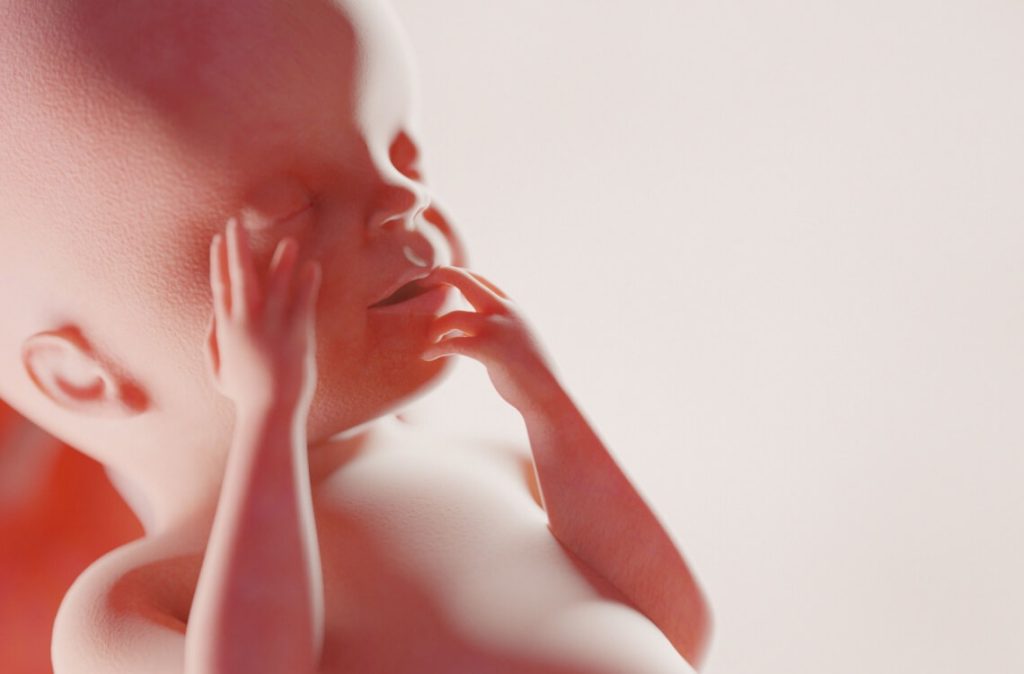Congratulations! At 23 weeks pregnant, you’re well into your second trimester.
Your body is going through more changes, and your baby is growing rapidly. You can’t wait to meet them!
Let’s explore what’s happening with your baby and your body, along with key considerations at this stage.
Your Baby at 23 Weeks of Pregnancy
By this week, your baby measures about 28–29 centimetres and weighs approximately 500 grams—roughly the size of a large mango.
Your baby is growing rapidly, and several key developmental milestones are taking place.
This is your little one’s progress at 23 weeks of pregnancy:
- Facial development: Your baby’s lips are now distinct, and if you were to have an ultrasound, you might catch him sucking his thumb. His tongue has fully formed, and taste buds are sensitive enough to differentiate salty, sweet and bitter tastes.
- Tooth buds: Tooth buds are forming in his gums, laying the foundation for milk teeth.
- Skin colour: Meanwhile, his skin begins to develop pigmentation, transitioning from pinkish and translucent to its eventual colour.
- Movements: There’s still plenty of room in your womb for your baby to twist, kick, and even perform somersaults. This activity helps develop his muscles and coordination.
- Senses: The bones and nerves of the inner ear are now functional, allowing your baby to sense balance and tell whether he’s upside down.
- Brain growth: His brain continues to grow at an impressive rate, while his eyelids might flutter open occasionally, though full opening won’t happen until the seventh month.
Your baby is becoming more and more aware of themselves at this point and even of the world outside.
They’re moving more frequently and you may notice this several times throughout the day.
Your Body at 23 Weeks of Pregnancy
Now that you are 23 weeks pregnant, there are several new changes going on in your body.
You may have gained more weight since the past week as your baby grows in your belly and you may be moving a bit slower as a result.
It’s important not to move too quickly or to rush. Take your time. You are carrying some extra weight, after all.
Here are some other new or returning changes that you can expect at 23 weeks of pregnancy:
- Breathlessness: As your uterus expands, it pushes against your diaphragm, and your ribs spread sideways. This reduces the space in your chest, making deep breaths slightly harder.
- Heartburn: With less room in your abdomen, your stomach and intestines shift upwards, which might lead to mild digestive discomfort, including heartburn or indigestion.
- Stretching sensations: As your womb grows, you may experience occasional stretching or mild aches in your abdomen. These sensations are typically normal and linked to ligament stretching.
- Dry skin: You might notice some changes in your skin, such as dryness or itchiness over your bump. Regularly applying a moisturiser can help soothe irritation and keep your skin feeling comfortable.
- Pregnancy brain: Hormonal changes can lead to forgetfulness, brain fog, confusion, and general absent-mindedness.
While it’s usually temporary, pregnancy brain can be dangerous especially if you forget to turn the stove off, or leave a candle burning in the other room.
It’s imperative at this stage of pregnancy and especially later as you progress, that you are accompanied and supervised.
If that is impossible, keeping a journal or using reminders can help you stay organised and most of all, safe.
Gestational Diabetes
At 23 weeks pregnant, your doctor may want to keep a close eye on your blood sugar levels.
Many expectant mothers develop something called gestational diabetes.
This is different from regular diabetes which is when your pancreas malfunctions or from other genetic predispositions.
Gestations diabetes, is a condition only seen in pregnancy. Nearly 20% of pregnant women are at risk of gestational diabetes, though many cases fly under the radar.
If you experience these symptoms alert your healthcare provider immediately:
- blurred vision
- excessive thirst
- frequent urination
- fatigue
- tingling or numbness in hands or feet
We all know that your blood sugar levels are controlled by the hormone insulin.
When you are well into your pregnancy, hormones produced in the placenta go into hyperdrive, namely estrogen, cortisol, and human placental lactogen.
While important for maintaining your pregnancy, they have a blocking effect on insulin.
This is called contra-insulin effect and usually begins around 20 to 24 weeks into the pregnancy.
As the placenta grows, more of these hormones are produced, and insulin resistance becomes greater.
This leads to higher blood sugar levels during pregnancy.
If left untreated, gestational diabetes can lead to complications during pregnancy and delivery.
This includes excessive birth weight (baby too large), prolonged labour, preterm labour, emergency C-sections, and even stillbirth.
Regular prenatal check-ups and blood sugar screenings are crucial for early detection and management.
Treatment often includes dietary adjustments, exercise, and sometimes medication.
Keep Paying Attention
New challenges await you at 23 weeks of pregnancy. Aside from controlling your blood sugar, the other precautions remain.
Maintain a healthy diet, take your prenatal vitamins, manage your stress levels and get plenty of exercise
Whether you’re feeling energised or experiencing challenges, remember that each step brings you closer to motherhood.
You’ve got this, mummies!
References
- Curtis, G. B., & Schuler, J. (2016). Your Pregnancy Week by Week (8th ed.). Hachette Books.
- Kaye, P. (2021). Your Pregnancy: Week by Week. SPCK Publishing.
- Riley, L. (2006). You and Your Pregnancy: Your Ultimate Week-by-Week Pregnancy Guide. Meredith Books.
- Shanahan, M. K. (2002). Your Over-35 Week-by-Week Pregnancy Guide. Da Capo Press
Disclaimer: The information provided in this article is for informational purposes only and should not be considered as medical advice from Motherhood. For any health-related concerns, it is advisable to consult with a qualified healthcare professional or medical practitioner.
For more insightful stories and fun recipes, stay tuned to Motherhood Story!
